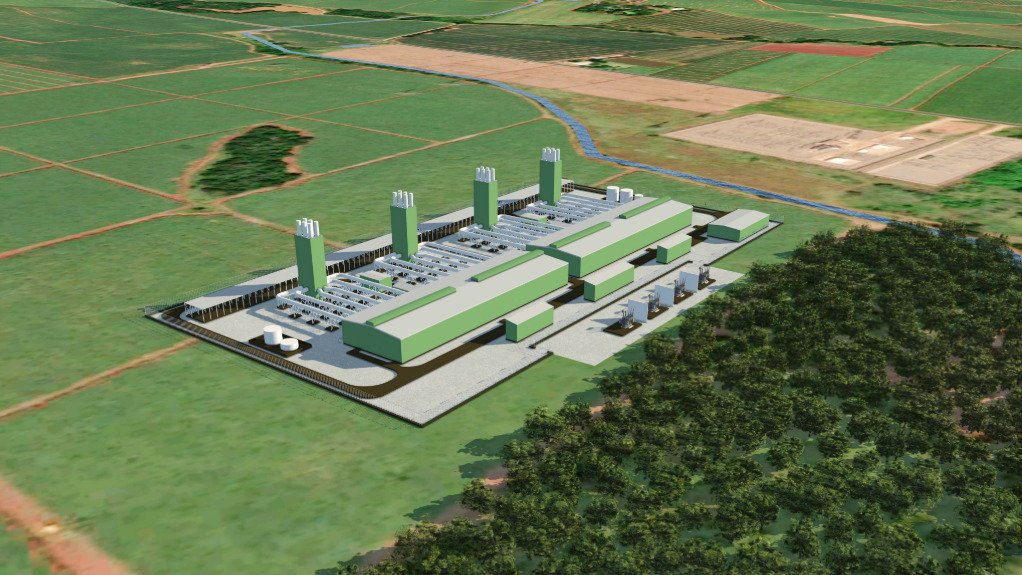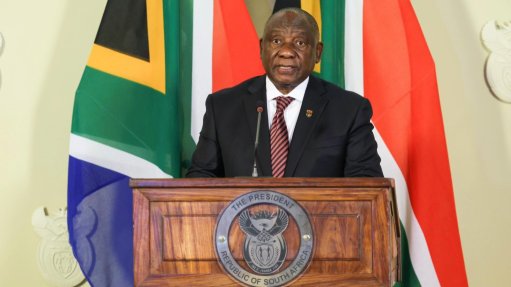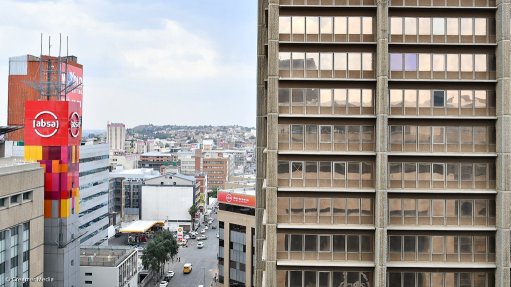Aspirant IPP advancing 1 GW flexible gas-engine project in Mpumalanga



FlexED CEO Wayne Glossop
An artist impression of the Khanyazwe Flexpower project
Aspirant independent power producer (IPP) FlexED is developing a 1 000 MW gas-engine project in Mpumalanga to provide the flexible generation and ancillary services that will be required as the share of variable renewable-energy generation in South Africa’s electricity system rises.
Known as Khanyazwe Flexpower, the project is being developed near Malalane, in Mpumalanga, in close proximity to the National Transmission Company South Africa’s (NTCSA’s) Khanyazwe substation and with confirmed access to the Rompco gas pipeline from Mozambique to South Africa.
CEO Wayne Glossop tells Engineering News the company, the name of which is pronounced ‘flekst’, is backed by investors that have grasped the importance of flexible generation – whether in the form of gas to power, pumped hydro or battery storage – to South Africa’s future electricity mix.
This perspective is based on extensive power-system analysis that shows that variable renewable energy, together with flexible generation, has emerged as the most cost-effective way to provide energy security, with cheap solar PV and wind providing the bulk of the electricity and the more expensive flexible generators closing any supply gaps that may arise as a result of their variability.
“Increasingly, the old equation of baseload, plus mid-merit, plus peaking to provide the suite of power supply and services needed for electricity security no longer applies.
“The new equation for delivering the most affordable, as well as reliable, electricity is a combination of renewable energy and flexibility, with the latter derived from multiple technologies of which FlexED’s focus is on gas, batteries and/or pumped hydro,” Glossop, who has been involved in power-system analysis for decades, explains.
This emerging equation is also partly reflected in the design of South Africa’s inaugural Gas Independent Power Producer Procurement Programme (GASIPPPP), the bid submission deadline for which has been delayed from March 25 to October 31, 2025.
Glossop says the GASIPPPP, which is premised on the 2019 version of the Integrated Resource Plan (IRP), indicates a desire from the NTCSA’s system operator to use the gas-to-power capacity flexibly, albeit with a load factor range of 25% to 65%. In addition, it wants the selected IPPs to provide it with ancillary services to maintain system frequency and voltage.
FlexEd believes the GASIPPPP design is attuned to the use of gas reciprocating engine technology, which is able to meet the dispatch requirements, with negligible water consumption, including between 730 and 1 460 starts yearly, or two to four daily starts.
He believes the design is sound, and expresses concern over lobbying efforts to delay the tender further and restructure it for a baseload-like profile, which some are arguing is required to provide the “anchor demand” to unlock a new liquefied natural gas (LNG) terminal.
FlexED is keeping its legal options open should such changes be made, arguing that a baseload solution would involve an entirely separate business case and government would also have to provide a reasonable justification, given that a baseload solution would be more expensive for consumers.
FLEXIBLE VS BASELOAD COSTS
Glossop has calculated the differential by comparing what it would cost to supply a 1-kW consumer, with a consistent demand profile, with electricity generated from renewables and flexible gas, as compared with electricity arising from a baseload-gas generator.
Using the $15/GJ gas price assumed in the draft IRP2024, which he acknowledges to be high, he assumes that the flexible gas generator will produce electricity at a cost of R3/kWh. Under the renewable-plus-flexible gas scenario, where the renewables are costed as 0.50c/kWh and will supply 60% of the load, the daily cost outcome for the 1-kW consumer is R36.
Even under an optimised scenario, where the gas price is lowered to $10/GJ so as to yield a baseload generator cost of R2/kWh, the cost to the 1-kW consumer would be R48 a day, or 33% more expensive.
“Using the current GASIPPPP round to procure baseload would be going against the primary principles of what has been asked for in the request for proposals (RfP) and also going against the views on gas as per the IRP2019 which clearly calls for flexible gas,” Glossop argues.
Instead of adjusting the RfP’s design, Glossop argues that the IPP Office should be focusing on adapting the gas-pricing mechanism, which he describes as “unbankable” in its current form.
FlexED argues this unbankability stems from: the imposition of cross-indexation risk by mixing the Henry Hub, Brent and Japan/Korea Market (JKM) price indices and capping prices to below JKM; the lack of a pass-through provision for the various components in the gas value chain, as well as the need to engage in both long-term and spot gas contracting; and uncertainty over the methodology that the regulator will use to price gas imported through the Rompco pipeline.
Should these issues be resolved, Glossop is convinced that there will be shovel-ready projects in a position to make bid submissions in October, despite prevailing uncertainty about LNG availability – an issue which he hopes will be addressed by the IPP Office recognising that the final investment decision on gas-supply infrastructure projects may potentially only be made once preferred bidders have been announced.
He reports that Khanyazwe Flexpower is in advanced discussions with a gas supplier aiming to import LNG from Mozambique and inject molecules into the Rompco pipeline.
FlexED is also convinced that a case exists for the investment absent baseload gas projects, given pent-up industrial and future electricity-related demand.
The Khanyazwe Flexpower project has received an environmental authorisation, which is currently being appealed, and the intention is to build it in phases to its final nameplate of 1 000 MW.
Glossop views the GASIPPPP as crucial to its first phase but does not discount concluding flexible supply contracts with private consumers or traders for subsequent phases.
“We are, thus, hoping that there will be no further delays to the GASIPPPP,” he concludes.
Article Enquiry
Email Article
Save Article
Feedback
To advertise email advertising@creamermedia.co.za or click here
Press Office
Announcements
What's On
Subscribe to improve your user experience...
Option 1 (equivalent of R125 a month):
Receive a weekly copy of Creamer Media's Engineering News & Mining Weekly magazine
(print copy for those in South Africa and e-magazine for those outside of South Africa)
Receive daily email newsletters
Access to full search results
Access archive of magazine back copies
Access to Projects in Progress
Access to ONE Research Report of your choice in PDF format
Option 2 (equivalent of R375 a month):
All benefits from Option 1
PLUS
Access to Creamer Media's Research Channel Africa for ALL Research Reports, in PDF format, on various industrial and mining sectors
including Electricity; Water; Energy Transition; Hydrogen; Roads, Rail and Ports; Coal; Gold; Platinum; Battery Metals; etc.
Already a subscriber?
Forgotten your password?
Receive weekly copy of Creamer Media's Engineering News & Mining Weekly magazine (print copy for those in South Africa and e-magazine for those outside of South Africa)
➕
Recieve daily email newsletters
➕
Access to full search results
➕
Access archive of magazine back copies
➕
Access to Projects in Progress
➕
Access to ONE Research Report of your choice in PDF format
RESEARCH CHANNEL AFRICA
R4500 (equivalent of R375 a month)
SUBSCRIBEAll benefits from Option 1
➕
Access to Creamer Media's Research Channel Africa for ALL Research Reports on various industrial and mining sectors, in PDF format, including on:
Electricity
➕
Water
➕
Energy Transition
➕
Hydrogen
➕
Roads, Rail and Ports
➕
Coal
➕
Gold
➕
Platinum
➕
Battery Metals
➕
etc.
Receive all benefits from Option 1 or Option 2 delivered to numerous people at your company
➕
Multiple User names and Passwords for simultaneous log-ins
➕
Intranet integration access to all in your organisation




















